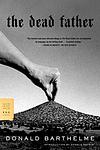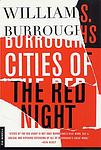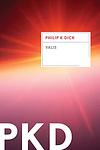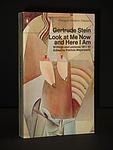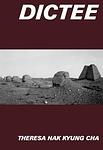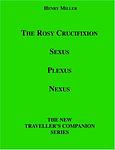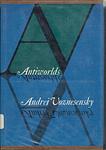The Greatest Russian, American "Experimental" Books of All Time
Click to learn how this list is calculated.
This list represents a comprehensive and trusted collection of the greatest books. Developed through a specialized algorithm, it brings together 305 'best of' book lists to form a definitive guide to the world's most acclaimed books. For those interested in how these books are chosen, additional details can be found on the rankings page.
Genres
The "Experimental" category of books is characterized by works that challenge traditional literary conventions and push the boundaries of form and content. These books often incorporate unconventional narrative structures, language, and themes, and may experiment with different mediums such as poetry, visual art, or multimedia. The goal of experimental literature is to create new and innovative ways of storytelling that challenge readers' expectations and expand the possibilities of what literature can be.
Countries
Date Range
Reading Statistics
Click the button below to see how many of these books you've read!
Download
If you're interested in downloading this list as a CSV file for use in a spreadsheet application, you can easily do so by clicking the button below. Please note that to ensure a manageable file size and faster download, the CSV will include details for only the first 500 books.
Download-
26. Sleepless Nights by Elizabeth Hardwick
"Sleepless Nights" is a novel that weaves together memories, reflections, and fictionalized episodes to paint a portrait of a woman's life. The narrative is fragmented and non-linear, reflecting the protagonist's introspective journey through her past relationships, experiences, and observations. Set against the backdrop of various American and European backdrops, the book delves into themes of love, loss, identity, and the complexities of the human condition. The protagonist's musings are interlaced with vivid character sketches of the people who have drifted in and out of her life, creating a tapestry of poignant and evocative vignettes that capture the essence of her restless, contemplative existence.
The 1794th Greatest Book of All Time -
27. Two Serious Ladies by Jane Bowles
Two Serious Ladies is a novel that follows the lives of two women, Christina Goering and Frieda Copperfield, who are both on their own personal journeys of self-discovery. Christina, a wealthy spinster, decides to abandon her comfortable life to explore the darker side of society, while Frieda, a married woman, leaves her husband during a trip to Panama to pursue a relationship with a teenage prostitute. The novel explores themes of identity, sexuality, and societal norms, challenging traditional notions of femininity and respectability.
The 1942nd Greatest Book of All Time -
28. The Dead Father by Donald Barthelme
The book is a surreal, postmodern narrative following a group of characters as they drag the physical manifestation of their dead father across a variety of landscapes. The characters grapple with their relationships to the father figure, exploring themes of authority, control, and the nature of storytelling itself. The novel is known for its experimental style, blending a range of literary techniques and genres to create a unique, fragmented narrative.
The 2041st Greatest Book of All Time -
29. Anagrams by Lorrie Moore
The novel revolves around the complex relationship between Benna Carpenter, an aerobics instructor and Gerard, a college professor. Benna constantly imagines different scenarios and alternate lives for herself and Gerard, including one where they have a daughter. The narrative structure of the book is unique, with each chapter presenting a different 'anagram' or version of Benna's life, reflecting her chaotic and imaginative inner world.
The 2179th Greatest Book of All Time -
30. Wittgenstein's Mistress by David Markson
The novel is a stream-of-consciousness narrative from the perspective of a woman who believes she is the last human on earth. She shares her thoughts, memories, and experiences in a non-linear and often confusing manner. The narrative is filled with cultural and historical references, creating a haunting and profound exploration of loneliness, memory, and the human condition.
The 2210th Greatest Book of All Time -
31. The Clay Machine-gun by Victor Pelevin
"The Clay Machine-gun" is a surreal and complex novel that explores the nature of reality and illusion. The story is set in post-Soviet Russia and follows a protagonist who has multiple identities, including a poet in 19th-century Russia, a 20th-century psychiatric patient, and a 21st-century advertising executive. The narrative moves between these identities and realities, blurring the lines between them and creating a layered and philosophical exploration of Russian society, identity, and the human psyche.
The 2276th Greatest Book of All Time -
32. The Collected Stories Of Lydia Davis by Lydia Davis
The collection is a compendium of short fiction that showcases the author's deftness in capturing the intricacies of human experience through precise, often experimental prose. The stories range from the very brief to the more developed, exploring themes of language, memory, and the often overlooked moments of everyday life. With a unique voice that combines wit, keen observation, and a mastery of form, the author challenges traditional narrative structures, inviting readers to engage with the text on multiple levels and to find meaning in the spaces between the words as much as in the words themselves. The result is a body of work that is both intellectually stimulating and emotionally resonant, cementing the author's reputation as a significant figure in contemporary literature.
The 2324th Greatest Book of All Time -
33. Cities of the Red Night: A Novel by William S. Burroughs
"Cities of the Red Night: A Novel" is a surreal, hallucinatory narrative that intertwines three storylines: an 18th-century pirate crew seeking utopia, a detective investigating a series of grotesque murders, and a pandemic causing spontaneous orgasms. The novel explores themes of homosexuality, anarchism, and the occult, using its disjointed narrative structure to challenge traditional understandings of time, space, and reality.
The 2363rd Greatest Book of All Time -
34. The Last Samurai by Helen DeWitt
"The Last Samurai" is a unique, intellectual novel that follows the life of a young boy named Ludo, who is raised by his single mother, Sibylla. Sibylla, a freelance transcriber, educates Ludo in various subjects from Greek to mathematics, using the film "The Seven Samurai" as a moral compass. As Ludo grows older, he embarks on a quest to find his father, using clues from his mother's past. His journey leads him to several men who could potentially be his father, each encounter teaching him more about the world and himself.
The 2701st Greatest Book of All Time -
35. Happy Moscow by Andrey Platonov
"Happy Moscow" is a satirical novel set in the Soviet Union during the height of Stalinist rule, following the life of a young woman, Moscow Chestnova, who is named after the capital city. Despite the harsh realities of life under an authoritarian regime, she maintains a positive and optimistic outlook, symbolizing the Soviet Union's propaganda that promoted an image of a happy and prosperous society. The novel, through its characters and their experiences, explores the paradoxes and contradictions of the Soviet society, challenging the official narrative of happiness and prosperity.
The 2766th Greatest Book of All Time -
36. VALIS by Philip K. Dick
The novel follows a mentally unstable man who begins to experience visions after being hit by a mysterious pink light. Convinced the light is a divine entity named VALIS, he and his friends embark on a quest to understand and communicate with it. As they delve into philosophy, religion, and science, the boundaries between reality and delusion begin to blur, leaving both the characters and the reader questioning the nature of existence.
The 2830th Greatest Book of All Time -
37. The Breast by Philip Roth
The book is a surreal and darkly comic novella that explores the bizarre transformation of a college professor who inexplicably turns into a giant breast. This metamorphosis leads him to confront a range of human experiences and emotions, including sexuality, identity, and the absurdity of existence. As he grapples with his new form, the protagonist reflects on his past life and relationships, while also dealing with the practical and philosophical implications of his current condition. The narrative delves into themes of alienation and the human condition, all while maintaining a satirical tone that challenges the reader's sense of normalcy and the boundaries of the self.
The 2948th Greatest Book of All Time -
38. Look At Me Now And Here I Am by Gertrude Stein
This collection of writings showcases a series of essays and reflections that delve into the intricacies of identity, perception, and the nature of existence through a unique and avant-garde lens. The author employs innovative language and narrative techniques to explore themes of self-awareness, the passage of time, and the fluidity of identity. Through a blend of autobiographical elements and philosophical musings, the work invites readers to reconsider their understanding of the self and the world around them, challenging conventional notions of narrative and meaning. The pieces within this collection are characterized by their experimental style, reflecting the author's broader contributions to modernist literature.
The 3100th Greatest Book of All Time -
39. The Cannibal: Novel by John Hawkes
The novel revolves around a small German town during World War II and its aftermath. The narrative is fragmented and nonlinear, filled with surreal and horrific scenes. The story is a blend of reality and dream, and it explores the themes of violence, power, sexuality, and the human capacity for evil. The protagonist is a traumatized and disfigured war veteran who is both repulsed and fascinated by the violence and cruelty around him.
The 3253rd Greatest Book of All Time -
40. Omensetter's Luck by William H. Gass
Set in a small Ohio town in the 1890s, the novel revolves around the enigmatic character Brackett Omensetter, a man whose mere presence seems to affect those around him in profound and inexplicable ways. The story is narrated from the perspectives of three different characters: the town's eccentric and paranoid physician, a reverend tormented by his lack of faith, and a local man who becomes obsessed with Omensetter. The narrative explores themes of religion, morality, and the nature of luck and fate.
The 3264th Greatest Book of All Time -
41. Spring And All by William Carlos Williams
The book in question is a hybrid work that combines poetry with prose, reflecting on the nature of creativity and the cycle of life. It presents a series of musings on the emergence of new life in spring, using this seasonal transformation as a metaphor for artistic innovation. The work is a seminal example of modernist experimentation, breaking with traditional forms and embracing a free verse style that captures the dynamic and often chaotic process of growth and change. Through its vivid imagery and philosophical insights, the book challenges readers to see the world with fresh eyes and recognize the potential for renewal and rebirth in the everyday.
The 3406th Greatest Book of All Time -
42. Dictee by Theresa Hak Kyung Cha
"Dictee" is a groundbreaking work that defies traditional genre classification, blending poetry, prose, and visual elements to explore themes of identity, displacement, and history. The book is structured around the lives of several women connected by their struggles with cultural and personal identity, including the Greek muse Clio, Joan of Arc, and the author's own mother. Through a fragmented and nonlinear narrative, the work delves into the complexities of language and memory, particularly focusing on the experiences of Korean immigrants and the impact of colonialism. The innovative use of multiple languages and formats challenges the reader to engage with the text on multiple levels, making it a profound meditation on voice, empowerment, and reclaiming one's history.
The 3431st Greatest Book of All Time -
43. Hermione by Hilda Doolittle
The book in question is a semi-autobiographical novel that delves into the inner life of a young woman named Hermione Gart, a stand-in for the author herself. Set in the early 20th century, the narrative explores Hermione's complex emotional world and her struggle to find her own identity amidst the constraints of society and her relationships. Through a stream-of-consciousness style, the novel examines themes of feminism, sexuality, and self-discovery, as Hermione navigates her way through love, intellectual pursuits, and the challenges of being a woman in a male-dominated world. The novel is recognized for its lyrical prose and its pioneering use of psychological introspection.
The 3469th Greatest Book of All Time -
44. Chevengur by Andrey Platonov
The book is a complex and philosophical tale set in the aftermath of the Russian Revolution, exploring the lives of various characters in a small town as they grapple with the utopian ideals of communism and the harsh realities of its implementation. Through the experiences of these characters, including a young revolutionary and a disenchanted wanderer, the narrative delves into themes of human nature, societal transformation, and the search for meaning in a world undergoing radical change. The story's blend of surrealism, poetic language, and political commentary creates a unique and often disquieting examination of the Soviet dream and the disillusionment that followed its pursuit.
The 3660th Greatest Book of All Time -
45. The Rosy Crucifixion by Henry Miller
The book is a semi-autobiographical trilogy that explores the author's life in 1920s New York City. The protagonist, a struggling writer, navigates through his tumultuous relationship with his wife, his various extramarital affairs, and his quest for artistic freedom and personal identity. The narrative is characterized by its graphic depictions of sexuality, philosophical introspection, and critique of societal norms. The book is a testament to the author's rejection of conventional morality and his pursuit of a life driven by passion and creativity.
The 3674th Greatest Book of All Time -
46. Zangezi by Velimir Khlebnikov
"Zangezi" is a complex avant-garde poem that blends elements of drama and epic literature to explore the themes of language, revolution, and cosmic philosophy. The work is structured around the titular prophet-like figure who communicates with both humans and celestial beings, delivering cryptic and prophetic messages. Through a series of chants, monologues, and dialogues, the text delves into the nature of existence and the power of words, employing a unique linguistic style that reflects the author's fascination with the transformative potential of language and his vision of a future shaped by a universal human culture. The poem is known for its experimental use of sound, language, and its radical departure from traditional narrative forms, reflecting the tumultuous changes of the early 20th century and the search for new means of expression.
The 3788th Greatest Book of All Time -
47. Christmas At The Ivanovs' by Alexander Vvedensky
"Christmas at the Ivanovs'" is a satirical play that delves into the absurdities of Soviet life during the early 20th century. The narrative unfolds during a Christmas celebration at the Ivanov family's home, where a series of bizarre and surreal events take place. The characters, including a detective, a poet, and various family members, engage in nonsensical dialogues and actions, reflecting the author's avant-garde approach to theater. The play critiques the disconnect between the state's ideological propaganda and the grim realities of everyday life, using dark humor and chaotic scenes to challenge the audience's perception of normalcy and rationality within a society under strict political control.
The 3798th Greatest Book of All Time -
48. Antiworlds by Andrey Voznesensky
"Antiworlds" is a collection of poetry that provides a glimpse into the Soviet Union during the Cold War era. The poems are characterized by their avant-garde style, exploring themes of love, politics, and the human condition. The book includes the author's reflections on his travels around the world, his experiences with other cultures, and his perspective on the political climate of his time. The poems are both personal and universal, offering a unique perspective on the world during a period of intense political and social change.
The 3802nd Greatest Book of All Time -
49. A School For Fools by Sasha Sokolov
The novel presents a fragmented and surreal narrative that delves into the mind of a young boy with a learning disability, attending a special school in the Soviet Union. Through a stream-of-consciousness style, the book explores the boy's experiences and perceptions, blending reality with fantasy, and time with memory. The protagonist's inner world is rich with poetic language and vivid imagery, reflecting his struggle to find his place in a society that marginalizes those who are different. The narrative structure defies conventional storytelling, offering a unique and challenging perspective on the nature of sanity, the power of institutions, and the complexity of the human psyche.
The 4025th Greatest Book of All Time -
50. Pushkin House by Andrey Bitov
The novel in question is a complex and multi-layered exploration of Soviet intellectual life, following the story of a literary scholar who becomes deeply entangled in his research on the life of a fictional 19th-century Russian poet. As the protagonist delves into the poet's work and biography, his own life begins to mirror the subject of his study, leading to a blurring of past and present, reality and fiction. The narrative weaves together themes of identity, history, and the power of literature, all set against the backdrop of the oppressive atmosphere of the Soviet Union, where the quest for personal and artistic freedom is fraught with peril and contradiction.
The 4140th Greatest Book of All Time
Reading Statistics
Click the button below to see how many of these books you've read!
Download
If you're interested in downloading this list as a CSV file for use in a spreadsheet application, you can easily do so by clicking the button below. Please note that to ensure a manageable file size and faster download, the CSV will include details for only the first 500 books.
Download

